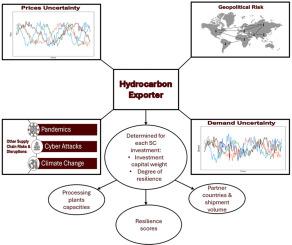Embedding resilience in natural gas monetization exports
IF 3.9
2区 工程技术
Q2 COMPUTER SCIENCE, INTERDISCIPLINARY APPLICATIONS
引用次数: 0
Abstract
The economies of several countries depend heavily on hydrocarbon exports, which significantly contribute to their gross national income. As this sector is vulnerable to risks and uncertainties, it is necessary to enhance the resilience of these exports to secure their returns and, hence, the financial security of the national economy. This work studies resilient investment planning to secure the financial returns of the hydrocarbon export sector, considering the production and transportation stages. We develop a novel two-step resilient investment planning approach for the hydrocarbon export sector. In the first step, a portfolio optimization framework is formulated based on Modern Portfolio Theory (MPT) to enhance resilience against price fluctuations associated with hydrocarbon supply chains. In the second step, nine hydrocarbon supply chain resilience metrics are employed to develop a degree of resilience indicator (DORI). The indicator evaluates the performance of financially optimal investment portfolios determined from step one against several risks associated with hydrocarbon exports. The proposed methodology is applied to a case study, considering exporting four chemical commodities to three importers from a natural gas-based economy to determine the optimal investment portfolio. The ability of the proposed DORI to predict portfolio resilience is assessed by running several disruption scenarios. Results highlight the importance of considering resilience metrics, as MPT efficient portfolios with the highest financial returns are not necessarily the most resilient to supply chain disruptions. Results also demonstrate that incorporating a supply chain perspective into the portfolio optimization framework provides additional insights into the hydrocarbon export problem.

在天然气货币化出口中嵌入弹性
几个国家的经济严重依赖碳氢化合物出口,这对其国民总收入作出了重大贡献。由于该部门易受风险和不确定性的影响,有必要加强这些出口的复原力,以确保它们的回报,从而确保国民经济的财政安全。这项工作研究弹性投资计划,以确保油气出口部门的财务回报,考虑到生产和运输阶段。我们为油气出口部门开发了一种新的两步弹性投资规划方法。第一步,基于现代投资组合理论(MPT)制定了投资组合优化框架,以增强对碳氢化合物供应链价格波动的抵御能力。在第二步中,采用9个油气供应链弹性指标来制定弹性程度指标(DORI)。该指标评估从第一步确定的财务最优投资组合的表现,以应对与油气出口相关的几种风险。所建议的方法应用于一个案例研究,考虑从一个以天然气为基础的经济体向三个进口商出口四种化学商品,以确定最佳投资组合。通过运行几个中断场景来评估所提出的DORI预测投资组合弹性的能力。结果强调了考虑弹性指标的重要性,因为具有最高财务回报的MPT高效投资组合不一定是对供应链中断最有弹性的。研究结果还表明,将供应链观点纳入投资组合优化框架可以为油气出口问题提供更多见解。
本文章由计算机程序翻译,如有差异,请以英文原文为准。
求助全文
约1分钟内获得全文
求助全文
来源期刊

Computers & Chemical Engineering
工程技术-工程:化工
CiteScore
8.70
自引率
14.00%
发文量
374
审稿时长
70 days
期刊介绍:
Computers & Chemical Engineering is primarily a journal of record for new developments in the application of computing and systems technology to chemical engineering problems.
 求助内容:
求助内容: 应助结果提醒方式:
应助结果提醒方式:


